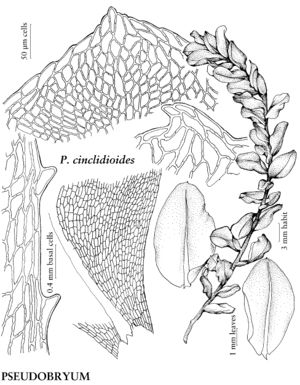Pseudobryum
Ann. Bot. Fenn. 5: 147. 1968.
| Taxon | Illustrator ⠉ | |
|---|---|---|
 | Pseudobryum cinclidioides | Patricia M. Eckel |
Plants 3–10 (–15) cm, in loose mats. Stems brown, erect, simple or sometimes branched distally, not dendroid; rhizoids brown, macronemata mainly proximal, scattered distally, micronemata present. Leaves green or yellow-green, dark-brown when old, crisped and weakly contorted when dry, erect or erect-spreading, often weakly undulate when moist, broadly ovate, elliptic, or sometimes orbicular, (3–) 4–6 (–7) mm; base not or short-decurrent; margins plane, green or yellow-green, 1-stratose, entire or lightly toothed to below mid leaf, teeth single, blunt or sometimes rounded; apex rounded, obtuse, or rarely retuse, apiculate; costa subpercurrent, ending well before apex, or rarely percurrent, distal abaxial surface smooth; medial laminal cells elongate, often ± rhomboidal, usually 3+:1, (30–) 40–80 (–110) µm, in diagonal rows, not collenchymatous, walls pitted; marginal cells indistinctly differentiated from medial cells, short-linear or rhomboidal, in 1–2 (–3) rows. Specialized asexual reproduction absent. Sexual condition dioicous. Seta single or rarely double, orange-yellow, 2–5.5 cm, flexuose. Capsule pendent, yellowish-brown, ovate, 2–2.5 mm; operculum conic-apiculate; exostome dark-brown; endostome yellowish-brown. Spores 31–40 µm.
Distribution
North America, Eurasia, circumtemperate to circumboreal
Discussion
Species 2 (1 in the flora).
Pseudobryum consists of two species of which one (P. cinclidioides; n = 6) is in the flora area and the other [P. speciosum (Mitten) T. J. Koponen; n = 7] is Asiatic. The latter is differentiated also by leaf characters and polysety.
Selected References
None.